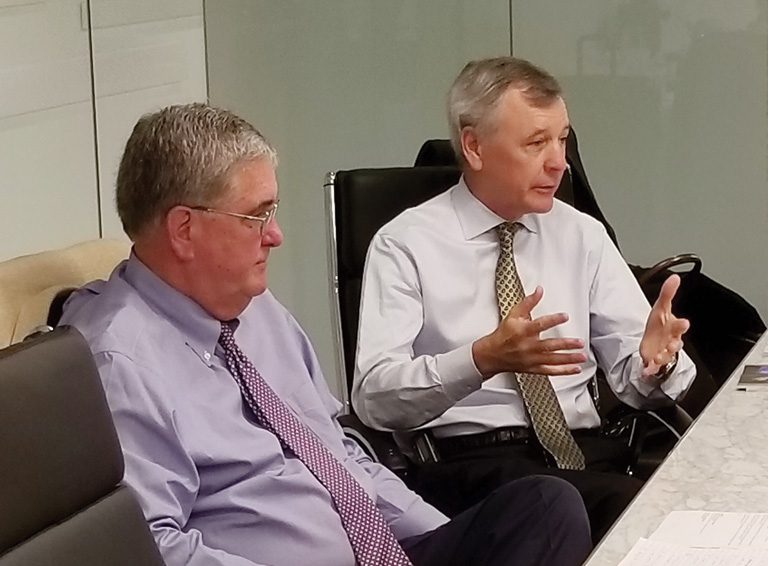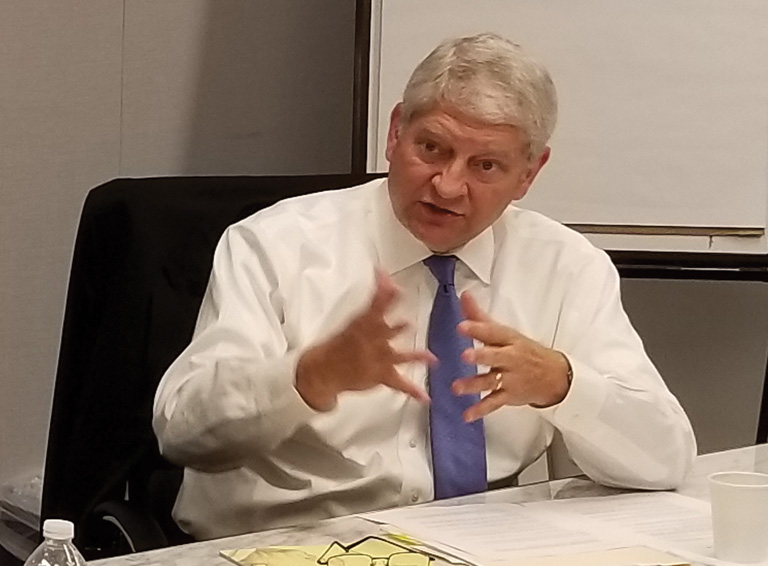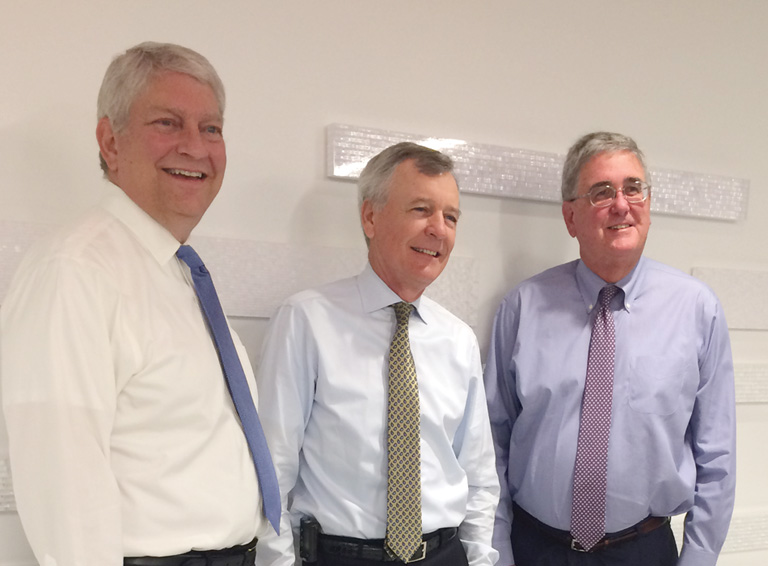Duke Energy, Southern Co., Dominion
Steve Mitnick is Editor-in-Chief of Public Utilities Fortnightly and author of the book “Lines Down: How We Pay, Use, Value Grid Electricity Amid the Storm.”
Jan Vrins is the global Energy practice leader at Navigant.


The chief financial officers of the three large southeast utilities (Dominion, Duke Energy and Southern Company) sat down with PUF editor-in-chief Steve Mitnick and Navigant Energy practice leader Jan Vrins to answer questions. In this second part of their discussion, they discuss the importance of innovation, the critical role of cybersecurity, and how they got where they are today. Part One appeared in July 2017's Public Utilities Fortnightly.
Navigant's Jan Vrins: How do you free up financial and human resources to innovate?
Southern Company's Art Beattie: Over the years, we've invested billions of dollars in robust, proprietary research and development to better serve our customers. We also opened an Energy Innovation Center, where our employees and partners collaborate to tackle some of the energy industry's most pressing issues.
But it's not so much that we've got a building and people dedicated to it, because we want all our employees to think about innovation, not just those within a building. For example, we had a contest a couple years ago. We called it "SO Prize."
We challenged employees to come up with their best ideas to make life better for our customers, and they came back with a lot of them. More than five hundred employees from around our company submitted nearly a thousand different ideas.
Some of them were kind of far out there. Some were a little closer to reality. The ideas ranged from drones and hydrogen-powered vehicles to desalinization and big data. There was a big panel that discussed them, almost like the TV show "Shark Tank." We selected six winners. There were financial prizes at the end of the day.
It was a way to spark innovation within our company. And to get people to start thinking about, "Well, we've done it this way for so many years; maybe there's a different path."
Jan Vrins: How do you deal with security and cybersecurity?
Southern Company's Art Beattie: Cybersecurity is a challenge for everybody. We're all attacked millions of times a day. We use a concentric approach to secure our facilities and our data.
We test all our employees with phishing attacks. It gets them to start thinking about good cyber hygiene.
Our CEO chairs the Electricity Subsector Coordinating Council, which coordinates government and energy sector efforts to prepare for, and respond to, disasters or threats to critical infrastructure. So, he is involved at the highest level of national security in the country.
Other people within our company are involved in that effort as well. We are contributing to, and learning from, all of the latest thinking around cyber and physical security.
Dominion's Mark McGettrick: One of the service territories we have is Virginia, which has a significant number of military and governmental facilities, like the CIA, and the Pentagon. We have been extraordinarily involved in cybersecurity, and also in physical security around our substations.
In terms of innovation, we have a multi-pronged approach to this. We invested in a private equity fund several years ago to make sure we keep abreast of new technologies. It was their charge to evaluate alternative technologies that could impact the electric and gas industry.
They invest in firms that are developing new innovative products and services. We test those products. Based on these reviews, the fund decides what to invest in, and what not to invest in.
I think it's given us a good appreciation of what's down the pike on energy storage and battery capabilities, among other things.
Last year we had many different people looking at improvements in technologies and innovation. We assigned a senior officer to coordinate these efforts and prioritize them for investment.
He's the "chief innovation officer." It's a little bit unusual in the industry, but we need to understand the breakthrough technologies coming to our industry.
Duke Energy's Steve Young: We have an idea lab in our technology department. We have a group of people that mix information technology skills with business unit skills. They develop applications for iPads and so forth.
They may use these applications in the field to photograph a machine. Then they transfer it back to an expert in the office or operations center who can say, "Here's what I think is wrong with it." As opposed to writing notes, and going back and forth, to and from the field.
Another area where we need more funding is security. This includes both physical and cyber. We have both twenty-four/seven physical and cybersecurity centers.
At our facilities, we've ramped up the security, fencing, and camera monitoring. The cameras feed twenty-four/seven.
On the cybersecurity side, we try to recruit people who understand penetration testing. We have an isolation area where we can take suspected malware. We isolate it, transfer it to law enforcement agencies, or assess it on our own.
What's amazing is the number of emails that don't get through to our employees. Ninety-eight percent of emails that come into our servers are rejected. I was stunned by that.
PUF's Steve Mitnick:Can you talk about some of your successes?
Duke Energy's Steve Young:There are a couple of things that we're pleased about. Over the past several months, we've been going through a portfolio transition. It's always challenging when you do that.
We exited a merchant generation business in the Midwest in 2015. We also exited a merchant generation business in Latin America, and closed the transactions in late 2016.
In this same period, we built a natural gas platform. That involves investments with our partners here in Atlantic Coast Pipeline and other pipelines, including Sabal Trail, and the acquisition of Piedmont Natural Gas.
Dominion's Mark McGettrick: I'd say our biggest success in the last ten years has been the successful execution of major projects.
We have built four or five very large scale gas plants, all on time, and on budget. We actually built a coal plant earlier this decade on time and on budget. We are getting ready to bring an LNG export facility online later this year. It's a four-billion dollar investment that's going to come in on schedule and on budget.
We have proved to investors that we can manage and execute large projects very effectively. Because of that, our shareholders have been rewarded with some of the highest returns in the industry for several years.
We've had excellent operation of our nuclear fleet, and our other generating fleet, as well as our distribution operations in terms of reliability. Safety is the number one focus for us in the company. Our safety record is excellent, but we can continue to improve.
Southern Company's Art Beattie: Last year was a great year for us.
The acquisition of AGL Resources expanded our footprint geographically and doubled our retail customer base. But we still maintained our risk profile in the regulated businesses that our investors are accustomed to. The fifty percent equity investment in the Southern Natural Gas pipeline system was a vertical integration for us.
We acquired a small company called PowerSecure, which will give us the opportunity to go beyond the meter, see what kind of growth that might provide, and what kind of learning we might get out of that in order to meet customers' evolving energy needs.
From a financing perspective, we raised more than twenty billion dollars last year. A lot was for these acquisitions. A portion of it was to issue equity for these acquisitions as well.
But even with all of this change, our traditional utility business model is still operating very well. In safety, reliability, and customer satisfaction, we have some of the top numbers in the industry. Southern Power - our competitive wholesale generation business - invested nearly four and half billion dollars in twenty-seven hundred megawatts, mostly renewable energy, last year.
That was more than two billion dollars more than what we thought we would invest. It was a very target-rich environment last year. By any measure, 2016 was a very successful year, both for us and for our customers.
PUF's Steve Mitnick: Can you talk about how you got to this point in your careers?
Duke Energy's Steve Young:Duke's the only place I've worked. I came out of college and immediately went to Duke Power in 1980. I was in finance and accounting. It's been a good place for me and I've enjoyed it.
Duke has always been a team-oriented place that looked at effort and collaboration and your ability to communicate and work through good times and bad times.
I've been fortunate to work for some very good people, including Lynn Good, my current boss.
Early in my career I worked on rate cases all the time, and I had a boss, the head of regulatory affairs, who took me under his wing. It was very helpful to me to work side by side with this very experienced person developing rate case information through the 1980s.
Dominion's Mark McGettrick:I've been very fortunate to have had the opportunity to manage many segments of our business.
I managed the generation portfolio for the company for seven years. I managed all the customer operations, gas and electric, for several years. I also managed all the corporate office, IT and HR functions, and I grew up in the electric distribution and transmission business.
As I moved into the CFO job, that background gave me a good understanding of how the whole company operated. I could speak to all the different lines of business with investors and explain our operations in detail.
I started in electric distribution after I came out of school and spent about six or seven years there. This was in residential, commercial and industrial line design.
There were two gentlemen at that time that ran our construction. They taught me several important lessons. First, they taught me the importance of customer commitment by our employees. These were the folks in charge of construction crews that were available all the time to keep customers' lights on and provide new service.
Second, they taught me that there are many different skillsets in a company. You must be able to communicate with all kinds of different people, whether they are craft employees, engineers, clerical employees, management, or customers. The final thing that they gave me was great respect for skilled craft employees.
I never did field work, construction work, electrical type work, or pipe work. But that's what makes these companies go, on the electric side and the gas side - those folks that are pipe-fitters, electricians, linemen, ground-men, substation employees and the folks that operate our generating stations.
These gentlemen molded my view of employees and the company - what it needs to look like and how to be successful. I thank them for that. They're both retired now. I'm sure they helped many others along the same way.
Southern Company's Art Beattie: Let me quickly echo Mark's comments. I have a lot of respect for our planners, operators, technicians, line crews and other employees who are on the ground every day providing energy for our customers.
As for me, I always think back to my first supervisor. In my first review, he told me I didn't say sir enough, and I said, "yes, sir."
I'm the CFO today. I'm wondering what he's thinking.
Anyway, I'm the poster child for getting into this slot in a different way than most others within Southern Company. Our CEO, Tom Fanning, talks about how he's done many jobs at many of our different subsidiaries. I worked at one subsidiary in various aspects, but all on the financial side. Be it accounting, finance, finance planning, regulatory relationships or corporate governance - it was all within one company.
Communication skills are important in your ability to deal with people at all levels. Just the translations for engineers to the accounting side.
I must tip my hat to several people I worked with along the way. A lot of them were engineers, not like me. They were considerate enough to sit down with me and explain issues I was oblivious to.
I would present information to them, and within five minutes they'd look at it and say, "There's something wrong here."
They taught me so much about how the business operated, and how to interact with other people outside of the financial world. Those were some of the skills that helped me along the way.
Category (Actual):
Department:
